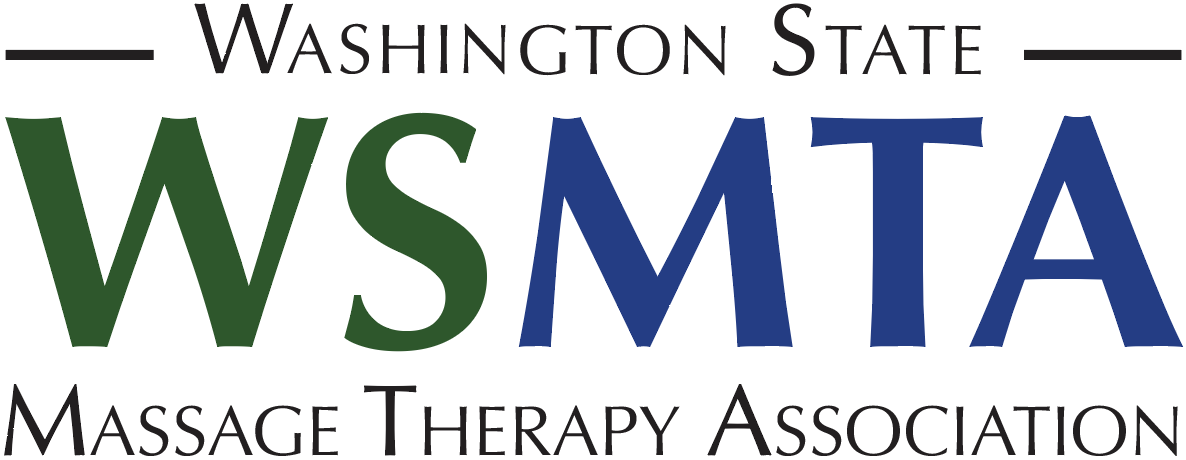Interstate Massage Compact
In January 2023, the lobbyist for a large national massage therapy chain initiated legislation to enter Washington into the Interstate Massage Compact at a time when almost all Washington massage therapists knew nothing about the Compact. WSMTA was instrumental in having this legislation pulled from the 2023 legislative session so our profession could have greater input in 2024.
WSMTA was tasked to research the compact, review the variety of healthcare compacts available, talk to the Washington State physical therapist and nurse associations to determine how their respective compacts work for them. This page represents the results of this research.
Below, in the blue squares are the facts about the Interstate Massage Compact and other healthcare compacts. In the lavender squares are the issues about the Compact that affect all massage therapists regardless of state and issues that affect Washington massage therapists specifically. If you have limited time, we recommend that you start with the issues and then read through the details as you are able to.
In the upcoming weeks, WSMTA will be polling Washington massage therapists to determine your interest in the Interstate Massage Compact. We need massage therapists to be as informed as possible to help determine the pathway our state should take, which is discussed towards the end of this webpage in the section, What should Washington State do about the Interstate Massage Compact?
If you have any questions, or would like to make comments, please contact us at: gr@mywsmta.org.
Thank you, The WSMTA Board Members
- Wherever you see this symbol "
Details " just click on the arrow or the word "Details" to see more, and then click it again to see less.
- These definitions are taken directly from the Massage Compact Model Legislation document. Please read through this list as these words and phrases are used throughout this webpage: To see the definitions, click on the "Details" link below:
- “Active Military Member” - any person with full-time duty status in the armed forces of the United States, including members of the National Guard and Reserve.
- “Charter Member States” - Member States who have enacted legislation to adopt this Compact where such legislation predates the effective date of this Compact as defined in Article 12.
- “Home State” - means the Member State which is a Licensee’s primary state of residence where the Licensee holds an active Single-State License.
- “Multistate License” - a license that consists of Authorizations to Practice Massage Therapy in all Remote States pursuant to this Compact, which shall be subject to the enforcement jurisdiction of the Licensing Authority in a Licensee’s Home State.
- “National Licensing Examination” - A national examination developed by a national association of Massage Therapy regulatory boards, as defined by Commission Rule, that is derived from a practice analysis and is consistent with generally accepted psychometric principles of fairness, validity and reliability, and is administered under secure and confidential examination protocols. WSMTA Comment: the only current exam that meets this definition is the MBLEX. Any other exams would have to be approved by the Compact Commission.
- “Remote State” - any Member State, other than the Licensee’s Home State.
- “Single-State License” - a current, valid authorization issued by a Member State’s Licensing Authority allowing an individual to fully practice Massage Therapy, that is not a restricted, student, provisional, temporary, or inactive practice authorization and authorizes practice only within the issuing State.
Background on Occupational Licensure Compacts: The Department of Defense (DoD) has partnered with The Council of State Governments (CSG) to fund and support the development of interstate compacts which include Massage, Dentistry and Dental Hygiene, Nurses, Physicians, Physical Therapists, Emergency Medical Technicians, Psychologists, Audiologists, Occupational Therapists and Counselors as well as other non-healthcare professions. Through licensure compacts, states establish uniform standards to lower barriers to multi-state practice while preserving a state's practice act and initial licensure process. States that meet the eligibility criteria join interstate compacts by agreeing to the uniform provisions through the legislative process. The DoD has personnel that move often from state to state and military spouses often have issues with transferring professional licenses from one state to another. The DoD's intent in supporting compacts by funding the creation of them has been to reduce barriers to employment for military spouses. What is the Interstate Massage Compact? The Interstate Massage Compact was created via a partnership between the Department of Defense (DoD), Council of State Governments (CSG) and the Federation of State Massage Therapy Boards (FSMTB). This Compact does not become effective until seven states pass legislation to enter into the Compact agreement. If enacted, the Compact would allow licensed massage therapists, who qualify for a Multistate License (Compact License) to join:
You can read the Washington State "Licensing by Endorsement" requirements by clicking HERE to learn about it. Military Spouses: Military spouses have the added benefit of being able to move within the compact and not lose their access to the Compact if they move to a Non Compact Member State. On May 5, 2023, the Washington Department of Health Program Manager Military Liaison reported to the Board of Massage that there were an estimated 72 military spouses in Washington who held active massage licenses, based on a survey the military had conducted.
What does "Mobility" mean within the Interstate Massage Compact? The Compact provides the opportunity for massage therapists who join the Compact to work in other Compact Member States. Here are several situational examples:
Moving: While working in other Compact Member States, a Multistate Licensee must maintain a residence in their Home State where the Home State License is held. If a massage therapist moves to another state and changes their residence to that state, the massage therapist does it on their own, outside of the Compact and must follow the laws of the new state to obtain that state's license. This massage therapist would then need to obtain a new Compact License if the new state is a Member State because it is the Home State that issues a Compact License. Issues massage therapists need to consider when traveling to work for large destination employers (hotels, spas) and multi-clinic employers with multiple state locations within the Compact:
How does the Interstate Massage Compact become activated? It takes the legislatures of 7 states to enact into law the "Interstate Massage Compact Model Legislation" to activate the Compact. The Model Legislation creates the "shell", or the "boundaries", for how the Compact will function.
Nurse Licensure Compact -- the compact model the Interstate Massage Compact is based on: The Interstate Massage Compact is based on the model used by the Nurse Licensure Compact (NLC), which was the only one of its kind, until the Interstate Massage Compact was created. Here are a few major points about the NLC:
The original Nurse Licensure Compact was created in 2000. The original Compact was dissolved and shortly after the dissolution, the current Nurse Licensure Compact (NLC) was created in 2018. Until 2023, Washington had remained out of the NLC, the nurses choosing not to join. However, employer interests (hospitals and large medical clinics, etc.) had stronger lobbyists and were able to convince the Washington State Legislators to have our state join the NLC against the nurses will. More about this will be stated in the Similarity of issues between the Nurse Licensure Compact (NLC) and the Interstate Massage Compact: section. These are characteristics of nursing employment:
Compacts that have the benefit of Compact Privilege: The Physical Therapists (PT) Compact and Occupational Therapists (OT) Compact both require Compact Licensees to obtain "Compact Privilege" for each state they choose to work in. This means that for every Compact Member State that a PT or OT wants to work in, they must contact their respective Compact, request Compact Privilege by paying a small fee, and then taking a jurisprudence exam (if the state requires it). Like the Nurse Licensure Compact and the Interstate Massage Compact, the PT Compact and OT Compact help Compact Licensees to work in Compact Member States, it does not help them to move from one Compact Member State to another. What benefits does Compact Privilege offer? Other Compacts that use Compact Privilege include:
What are the remaining types of healthcare Compacts?
| Issues regarding the Interstate Massage Compact: Before reading this section, we recommend that you have read at a minimum the following blue sections: The primary issues that WSMTA has regarding the Interstate Massage Compact revolve around the Compact Model that was selected and the fact that the nursing profession is structurally different from our profession. Ultimately, WSMTA feels that massage therapists holding a license through the Interstate Massage Compact will potentially:
To read about these issues, please click on the link below: 1.) Issues created by the Compact Model selected: The two largest issues WSMTA has with the Interstate Massage Compact have to do with the model selected -- the Nurse Licensure Compact. We believe that it would remove too much regulatory authority from the states and the Compact Commission and gives too much freedom of movement to the Multistate Licensee (the massage therapist). Without controls built in to ensure the safety of the Multistate Licensee and the public, it will create extra expense for Member States, Multistate Licensees and the Compact.
2.) Potential long-term Issue created by having Multistate Licensees in Washington State: Currently, massage therapists from other states who move to Washington, are vetted by the Department of Health to become Washington State massage therapists and then they eventually get absorbed into the local massage culture. However, if the Compact were to bring numerous temporary workers to our state, how will they comport themselves in the temporary time they work here if they are oblivious to our scope of practice, our role as healthcare providers and all the requirements we work within to be massage therapists in Washington State?
Issues regarding CSG and FSMTB’s presentation of information about the Compact:
Note: WSMTA has contacted the Council of State Governments (CSG) about some of the inconsistencies on the Interstate Massage Compact website hosted by CSG. At some time in the future, some of these inconsistencies may be changed, if that happens, we will update our webpage accordingly. WSMTA has concern over how the Interstate Massage Compact is being presented by the Counsel of State Governments (CSG) and FSMTB on the Compact website and in their talks to interested parties. Only the Compact Commission (should it be created) can create the rules that will govern the Compact, yet CSG and FSMTB are making statements on outstanding topics as if they have already determined the regulations prior to the creation of the Compact Commission. In addition, they are not fully explaining the benefits of the Compact, such as mobility, and what might be a benefit in one state, might not be in another. Finally, WSMTA is concerned about how the educational requirement of 625 hours is being handled and that it could lead to lowering the standards of our profession. To read about these issues, please click on the link below: 1.) WSMTA is concerned that CSG and FSMTB appear to be glossing over some of the benefits of the Compact, especially when mentioning mobility and enhancing public safety to make them appear more attractive:
2.) WSMTA is concerned that some of the information that CSG and FSMTB are presenting about the Interstate Massage Compact seems to be based on a foregone conclusion, as if what they are saying is how an issue will be handled. What actually happens will be dependent on the Compact Commission creating rules, not what CSG and FSMTB state will happen. FSMTB and CSG should be stating that these are “possible solutions to this problem”, or, “if the Compact Commission approves our suggestion”. Instead, they are portraying these possible solutions as facts, as if these decisions were already made before the Compact Commission has been created. 3.) WSMTA is concerned that how CSG and FSMTB are using "625 hours" may lower the standards of our profession. In CSG and FSMTB's statements about the minimum hours of education, 625-hours of massage education is discussed as the most important aspect of education. However, what really is important is the content that adds up to 625 hours. If you look at their document “Why 625?” at https://massagecompact.org/wp-content/uploads/sites/32/2023/01/Why-625.pdf you will see this statement:
WSMTA feels that this statement omits a critical fact, neglecting the far more important fact of course content. ELAP is a great piece of work that helped to define what the entry-level minimum education should be for a massage therapist to practice safely. Many massage therapy organizations came together to sponsor this work so it has the support of the vast majority of the massage community.
Issues with "who" will help create the initial Compact Commission Rules: The Compact Model Legislative Language states in Article 8, section B, subsections 1 and 2:
It also states in the Definition section in Article 2:
This language is not clean and clear which creates issues. In other Compacts, it is very clear. In some states, the Board of Massage holds all power to regulate, issue licenses and oversee the practice of massage, but in other states these responsibilities are split between the Board of Massage and a state agency, like Washington's Department of Health or the Department of Licensing in other states. In the states that split responsibility, it could be the state agency's Executive Director which becomes the state's delegate to the Compact Commission or it could be a Board Member depending on each state's given situation. Or, it could be possible for the Board of Massage and the Department of Health (or equivalent agency) to split duties as the delegate to the Compact Commission can always assign a designee. In states, like Washington, the Executive Director (ED) -- or the equivalent depending on the state -- of each state's regulatory agency would most likely be the delegate for the Compact Commission. In Washington, the ED is an employee of the Department of Health who oversees about 4-5 Professional Boards. Executive Directors generally do not spend more than a couple of years, at most, with any Board they manage. EDs are generally not healthcare providers but lean more toward being educated in public policy administration. Here are WSMTA's three primary concerns:
In addition:
Possible Solution: WSMTA suggests that should Washington join the Compact in the early stages of developing Compact Commission Rules that it should send both an ED (or other Department of Health designee) and a Board of Massage professional member so that they can both bring their strengths and perspectives. This way our profession is better represented. Only one of these people would be the official delegate and would be able to vote, but together, they would offer the best solutions. Similarity of issues between the Nurse Licensure Compact (NLC) and the Interstate Massage Compact: Back in February 2023, when WSMTA began further exploration about the Nurse Licensure Compact, we became aware of the documents that the Washington State Nurses Association (WSNA) had published online. WSNA, as well as other states' nurse associations had issues with the NLC and had refused to join the NLC. The issues they have are very similar to WSMTA's issues regarding the Interstate Massage Compact. The following are some of the postings WSNA has made.
Nurses in Washington state did not want to join the Compact. Like we mentioned in the "Nurse Licensure Compact -- The compact model the Interstate massage Compact is based on:" section, large employers were able to overcome the nurses objection to joining their compact and were able to have legislation passed in 2023 forcing the nurses to join. Similarly, the Massage Therapy Compact has also gained support from large destination resort employers who have been invited to attend CSG and FSMTB sponsored gatherings as vocal supporters of the Compact. Also, in January 2023, it was the lobbyist for a large national massage therapy spa chain that initiated legislation to enter Washington into the Interstate Massage Compact at a time, when Washington massage therapists knew nothing about the Compact. WSMTA was instrumental in having this legislation pulled from the 2023 legislative session so our profession could have a greater input in 2024.
The Compact is not likely to satisfy the employment needs caused by massage therapist shortages:
WSMTA found one research document on the topic of the movement of nurses in the Nurse Licensure Compact (NLC) for employment purposes. The title of the document is: Labor Supply Effects of Occupational Regulation: Evidence from the Nurse Licensure Compact © 2016 by Christina DePasquale and Kevin Stange, which can be found at www.nber.org/papers/w22344.pdf Note: this document is a working paper and is not peer reviewed. It was created in 2016, well before the pandemic interrupted the flow of people and goods and two years prior to the dissolution of the original Nurse Licensure Compact. This is the abstract from the document (the authors provide permission to copy two full paragraphs):
This is from the conclusion on page 26:
WSMTA feels that massage therapists, at least for the next 5-10 years, will probably experience a similar situation as put forward in this research paper. While we are currently experiencing a national shortage of massage therapists, we don’t have quite the same situation as nurses. Nurses can work for travel nurse employers that can either be local or multi-state. Massage therapists do not have this type of employment. If massage therapist shortages are big enough, as they are now, it’s possible some multi-state massage therapy clinic employers and multi-state destination hotels and spas might entice some massage therapists with higher pay or temporary housing to cross state lines to come temporarily work for them via a Compact, but the compact will not help those workers to move. Conclusion: WSMTA feels that the Compact will provide benefits on an individual basis, but it will not solve labor shortages or increase the supply of massage therapists. If “A” State is short on massage therapists for example, and employers recruit out-of-state massage therapists from “B” State to come work to fulfill the demand, there more than likely will be just as many “A” State massage therapists who get pulled away to work in other states because of higher wages offered by employers there facing their own staff shortages. WSMTA feels that our profession would be better off having money spent recruiting students into massage schools instead of employers recruiting LMTs away from other employers. |
What should Washington State do about the Interstate Massage Compact?
WSMTA perceives that there are 4 ways that Washington State could act regarding the Interstate Massage Compact:
-
Join Now: Be one of the first 7 states to pass into law the Interstate Massage Compact Model Legislature language, with the intent of influencing the Commission Rules that are created.
-
Possible Partial Solution to issues with the Compact Model: It could potentially be possible to circumnavigate some of the issues created by using the Nurse Licensing Compact as the compact model. If the Interstate Massage Compact Commission would require all LMTs to register all places of business or employers outside of their Home State with the Compact, this would enable each Remote State, should they choose, the ability to:
- Know who may be working in their state so any legal and regulatory changes can be provided to Compact Licensees working in their states.
- Administer a jurisprudence exam to Compact Licensee who indicate they work in their state. This exam would most likely be administered after an LMT has begun working in a Remote State and they could potentially be prohibited from continuing to work in that state if they can not pass the exam. Ideally, the exam should be administered prior to an LMT working in a new state in case there is an issue in their taking the exam
- Ending membership in the Compact may not be possible: In the event that the Compact does not work for Washington, it would require the legislators to repeal the RCW that creates Washington's membership in the Compact. Since legislators change over time, this might not be easy or even possible to do. A reminder that Washington joined the Nurse Licensure Compact against the will of the nurses.
-
Possible Partial Solution to issues with the Compact Model: It could potentially be possible to circumnavigate some of the issues created by using the Nurse Licensing Compact as the compact model. If the Interstate Massage Compact Commission would require all LMTs to register all places of business or employers outside of their Home State with the Compact, this would enable each Remote State, should they choose, the ability to:
- Join Later: Washington could wait to see how the Compact Commission develops its rules and determine at a later date if the Compact is something that will be beneficial for Washington LMTs.
- Not Join: Remain outside of the Interstate Massage Compact.
- Modify the Model Language prior to 7 states ratifying the Compact Model Legislative Language and activating the Compact: If there is a coordinated effort it could be possible to modify the Interstate Massage Compact model Legislative Language to incorporate changes that would make it more functional. However, for this to happen, seven states would have to put into law this modified Compact Model Legislative Language to activate the Compact, which would take a strong outreach effort to reach out to individual states and national associations.
Military Spouses: If Washington chooses to remain outside of the Compact, or the Compact is never activated, Washington legislators seem amenable to helping military spouses to more easily become licensed in Washington for the duration of their spouses deployment. There are other states that have enacted laws creating a simpler pathway to licensure for military spouses that Washington could copy.
Important Links:
Interstate Massage Therapy Compact:
Interstate Massage Compact Q&A: Here are some of the most common questions and the answers. The answers come from two different locations, the Massage Compact Model Legislative document (these are listed by Article number), and the Council of State Governments (CSG) Interstate Massage Compact webpages. Why both you might ask? We have included both because sometimes the CSG and FSMTB answers don't always align with the Compact's Model Legislative language and the Model Legislative language is the ultimate authority until the Compact Commission is created should the Compact be activated. Note: WSMTA has contacted the Council of State Governments (CSG) about some of the inconsistencies on the Interstate Massage Compact website hosted by CSG. At some time in the future, some of these inconsistencies may be changed, if that happens, we will update our webpage accordingly. What is an interstate compact?
Answer
How can a state, or jurisdiction, become a member of the massage compact?
Answer
How does the massage compact work?
Answer
What is a multistate license?
Answer
ARTICLE 2- DEFINITIONS, Subsection H.
What are the eligibility requirements for a multistate license?
Answer
A licensed professional massage therapist must:
How are military spouses different within the Compact?
Answer
Do continuing education hours count toward the 625-hour requirement?
Answer
|
If you have any questions, or would like to make comments, please contact us at: gr@mywsmta.org. |



